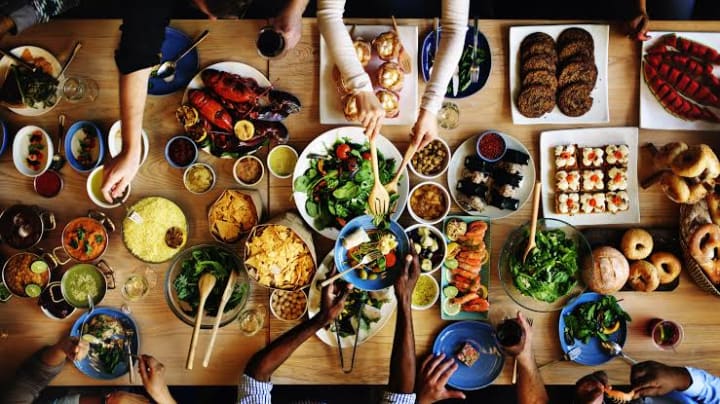FOOD ANTHROPOLOGY
Exploring Food Anthropology: Unveiling Cultural Traditions through Cuisine

INTRODUCTION:
Food is much more than mere sustenance; it is a window into the rich tapestry of human culture. Food anthropology, a fascinating field of study, delves into the relationship between food and culture, examining how culinary practices shape and reflect societies. By exploring the origins, preparation methods, and social significance of various foods, food anthropologists help us understand the diverse ways in which people around the world nourish their bodies and express their identities.Food anthropology is a branch of anthropology that focuses on the study of food as a cultural phenomenon. It examines the relationship between food and various aspects of human life, including social structures, identity formation, rituals, and belief systems. Food anthropology goes beyond simply studying the nutritional aspects of food and delves into the cultural, social, and historical contexts surrounding food practices.

ORIGINS OF FOOD ANTHROPOLOGY:
The roots of food anthropology can be traced back to the early 20th century when scholars began recognizing the importance of food in understanding human societies. Pioneers like Margaret Mead and Claude Lévi-Strauss explored the cultural significance of food, highlighting how it is intricately intertwined with rituals, beliefs, and social structures.Anthropologists study diverse aspects of food, including its production, distribution, and consumption. They investigate topics such as food taboos, culinary traditions, food symbolism, and the social significance of meals. By examining food practices across different cultures and historical periods, food anthropology sheds light on the complex relationship between humans and the food they eat.

CULINARY TRADITIONS AND IDENTITY:
Food serves as a powerful marker of identity, reflecting both individual and collective cultural heritage. Through the study of food anthropology, we gain insights into the unique flavors, ingredients, and cooking techniques that define specific regions or ethnic groups. For example, the use of spices in Indian cuisine or the emphasis on fresh ingredients in Mediterranean cooking highlights the distinct culinary identities of these cultures.While traditional food studies primarily focus on analyzing the nutritional composition and dietary habits of different populations, food anthropology takes a broader approach by examining the cultural significance of food, its symbolic meanings, and its role in shaping identities and communities. It explores how food practices are influenced by factors such as history, geography, social structures, and power dynamics.

RITUALS AND FOODWAYS :
One important concept in food anthropology is "foodways," which refers to the cultural, social, and economic practices surrounding food. Foodways encompass not only the production and consumption of food but also the beliefs, rituals, and social interactions associated with it. Through the study of foodways, anthropologists gain insights into how food reflects and shapes cultural values, social relationships, and identities.Food rituals play a central role in many societies, serving as a means of celebration, connection, and communication. From elaborate feasts during religious festivals to the sharing of meals at family gatherings, food rituals foster social cohesion and reinforce cultural values. Food anthropologists study these practices to understand the symbolic meanings attached to different foods and the ways in which they shape social bonds.

GLOBALIZATION AND FOOD CULTURE :
Food anthropology also explores issues related to food globalization, food security, and food justice.In an increasingly interconnected world, globalization has had a profound impact on food cultures. Food anthropology explores how culinary traditions evolve over time as a result of migration, trade, and cultural exchange. It examines how global food trade and industrialization impact local food systems and traditional culinary practices. Additionally, it addresses questions of food access, nutrition, and the social inequalities related to food distribution and availability.It also examines the fusion of cuisines, the adoption of foreign ingredients, and the transformation of traditional cooking methods, shedding light on the complex dynamics between globalization and local food practices.

FOOD INEQUALITY AND SOCIAL JUSTICE:
Food anthropology also addresses issues of food inequality and social justice. By examining food systems, access to nutritious food, and the impact of industrialization on traditional agriculture, scholars in this field seek to understand and address disparities in food distribution and consumption. They highlight the importance of sustainable food practices and advocate for equitable food policies.Overall, food anthropology provides a holistic understanding of the complex relationship between humans and food, shedding light on the cultural, social, and economic dimensions of our food practices.

About the Creator
Joan Godwin
I'm a passionate content creator and storyteller.I believe in the power of words,visuals,and storytelling to captivate and create meaningful connections.I strive to produce thought-provoking content that resonates with audiences.





Comments
There are no comments for this story
Be the first to respond and start the conversation.